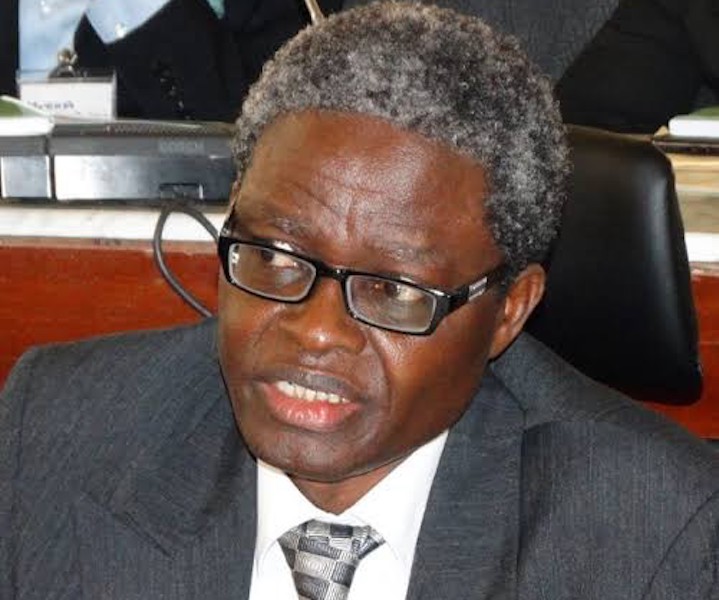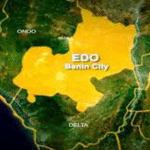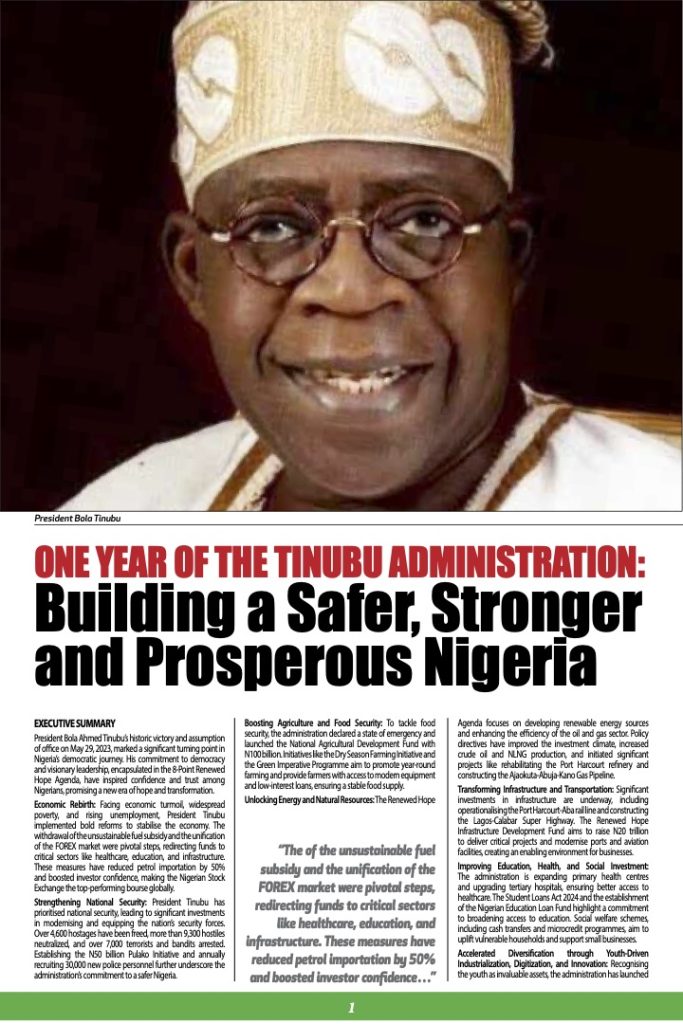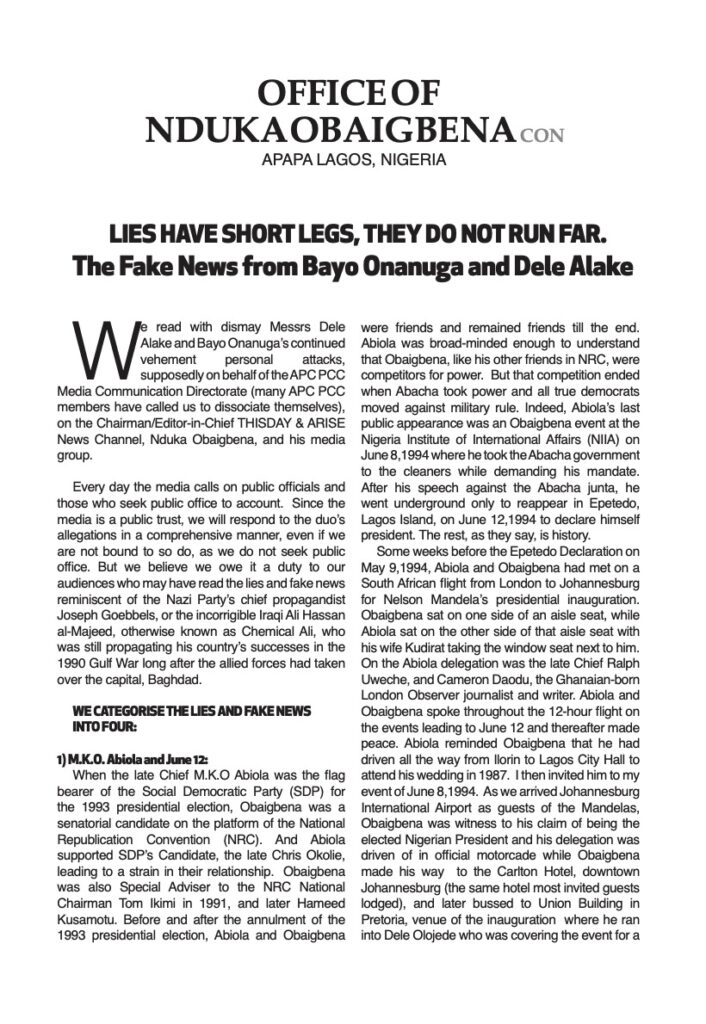Latest Headlines
Sino-Nigerian Ties and Attachment of Nigeria’s Presidential Jets in France: Beyond Aircraft Immunity

Bola A. Akinterinwa
Repudiation of validly contracted agreement, contrarily to the principle of sanctity of agreement or pacta sunt servanda, is not taken with kid gloves in international law and relations. When an agreement is done by a sovereign State and the obligations created are not respected by the signatories, the international responsibility of the concerned signatory may be raised. The same is true when the constituent parts of a nation-state do an international agreement. This is because the constituent parts are not recognised to act on behalf of the Federal Government. It is Nigeria that has to be internationally held responsible.
Explained differently, the dispute between the Zhongshan Fucheng Industrial Investment in China and the Ogun State in south-west Nigeria over the development of a free-trade zone as a basis to attract international investments, is a case in point. Ogun State cannot enter, as a state government, into international relations. It is not a sovereign State recognised internationally as such. In fact, the other contracting party is also a private entity. However, if we admit that the contracting parties cannot enter into international relations, how do we explain the fact that Nigeria’s property were attached or seized internationally? All aircraft have nationality. Nigeria’s presidential jets are Nigerian in registration, citizenship, ownership, and belong to the Government of Nigeria. They have the insignia of Nigeria.
The attachment of the three jets is currently raising questions: why is it always that policy makers, signatories to international agreements, and civil servants cannot reckon with international obligations the country has subscribed to? The Nigerian Institute of International Affairs (NIIA) is statutorily designated to be the depository of all agreements negotiated and signed by the Government of Nigeria. Why is this not complied with? What makes it difficult to have a joint research, monitoring, and protection committee, to comprise the NIIA, Federal Ministry of Justice, and the Ministry of Foreign Affairs, to compile and organise all agreements done by Nigeria, and to draw attention to them, especially when they are falling due in terms of payment of assessed payments to international organisations, etc.?
Sino-Nigerian Ties and the Attachment
Sino-Nigerian ties are generally warm at the governmental level, but still characterised by strains and constraints. Warmth and irritants are the two sides of the Sino-Nigerian relations. Both countries have warm collaboration at the levels of trade, science and technology, education and culture, development aid, health, politics, investment and military. The dynamics of the good relationship include October 1 as their National Day during which, in Nigeria, the Chinese Embassy in Nigeria often celebrates their day before October 1 in deference to Nigeria. The Government of Nigeria appreciates this. Besides, doing so prevents sharing of guests on the same day. In other words, the likely guests to be invited by China and the Nigerian government are the same. The diplomatic community is generally invited to the celebration of Nigeria’s Independence Day. And true enough again, Nigeria-China relations is at the epicentre of the China-Africa relations. More interestingly, since the signing of special agreements with the Beijing authorities by the Olusegun Obasanjo administration in 2005, politico-economic ties have been waxing stronger.
For instance, an agreement (MoU) was done in 2018 on the Chinese BRI (Belt and Road Initiative) cooperation which enabled Nigeria to accede to the membership of the BRI forum. The involvement of the Chinese in the economic, and particularly in the infrastructural, sector, is considerable. The Chinese built the Abuja Metro Line and the Lagos Rail Mass Transit. They are also the builders of the Zungeru Hydropower Plant, National Data Centre in Kano, the industrial parks in Lekki, Lagos State, and in Ogun State.
At the level of economic ties, Nigeria is China’s second largest export market and major investment destination in Africa. On bilateral trade, the OEC has it that ‘in 2022, China exported $21.48bn (worth of goods and services) to Nigeria. The main products that China exported to Nigeria were Non-Knit Women’s Suits ($792m), Rubber Footwear ($566m), and Broadcasting Equipment (503m). Over the past five years, the exports of China to Nigeria have increased at an annualised rate of 11.9%, from $12.2bn in 2017 to $21.48bn in 2022.’
Additionally, the OEC says ‘in 2022 China did not export any services to Nigeria…In 2022, Nigeria exported (goods worth) $1.52bn to China. The main products that Nigeria exported to China were petroleum Gas ($451m), crude petroleum ($299m), and Lead Ore ($94.6m). Over the past five years the exports of Nigeria to China have decreased at an annualised rate of 0.4%, from $1.56bn in 2017 to $1.52bn in 2022.’ And more interestingly, China’s export to Nigeria as at June 2024 was valued $1.44bn, while imports were valued $131m, hence a positive trade balance of $1.31bn in favour of China. In the same vein, Chinese foreign direct investments in Nigeria was $2.7bn in 2022. It declined to $2.3bn in 2021. Nigeria’s indebtedness to China was $4.73bn as at June 30, 2023. In fact, ‘the top five partner countries of origin for imports to Nigeria was China (N1,973.34bn (https://www.nigerianstat.gov.ng).
Besides, there is the Chinese Police Station in Benin City, also referred to as ‘Service Station’ in some other countries. It is an organ of the Beijing authorities to control the criminal activities of Chinese living outside of China. For instance, ‘from April 2021 to July 2022, 230,000 nationals had been “persuaded to return” to face criminal proceedings in China, says the Safeguard Defender. Explained differently, the existence of a Chinese police station in Nigeria is both good and bad: good in the sense that it helps the Government of Nigeria to monitor and contain criminal activities by Chinese in Nigeria, and bad because it creates a parallel police system within Nigeria. It is nothing more than a competing sovereignty. But whatever it is or how it is taken, it clearly reflects an entente between the two governments.
Culturally and educationally, an increasing number of Nigerians are learning Chinese language being a working language of the United Nations. There are two Confucius Institutes in Nigerian universities. There are more than 7,500 Nigerian students in China. Both countries have co-hosted the ‘Happy Chinese New Year,’ Temple Fair,’ the Chinese Film Festival,’ the Chinese Bridge,’ and the ‘Chinese Proficiency Competition.’
In essence, as told by the Chinese new ambassador to Nigeria, H.E. Dunhai, ‘China’s development plays an important role for the stability and prosperity of a multi-polar world. We (China) will also continue to support Nigeria’s social and economic development with concrete action and share our development benefits with the country.’ In this regard, if the relationship is generally good at the governmental level, why is it not so at the level of people-to-people and contractual relations? The case of Ogun-Guangdong Free Trade Zone dispute serves as one explanation.
In 2007, the Ogun State government contracted the Chinese firm to manage a Free-trade Zone. For one reason or the other, a misunderstanding arose in 2015 which prompted the quest for an arbitration in 2016 and eventually to the arbitral award of over $60m against the Federal Government in 2019. It was this factor of contractual discontinuity that has prompted the Chinese attachment of Nigeria’s aircraft. And true enough, there is no disputing the fact that Nigeria of today is heavily indebted to China and the debt service has always been on the increase. Solving the problem of indebtedness cannot be by disregarding contractual obligations. Government cannot but seek diplomatic mediation of the saga as desideratum.
The three aircraft were flown to France for routine check and the Federal Government only learnt about their attachment on August 14, 2024 during the routine service and based on the orders of the Judicial Court of Paris dated March 7, 2024 and August 12, 2024 at the instance of the Chinese party. On the one hand, the Special Adviser to the President, Bayo Onanuga, reportedly accused the Chinese of employing subterfuge to acquire offshore assets of the Federal Government and that the Federal Government was not under any contractual obligation with the Chinese company.
As much as the Federal Government might have not directly reached any contractual agreement with the Chinese company, the truth remains that, under the rules of public international law, the Federal Government of Nigeria necessarily accounts for the activities and derogations of international law by its citizens and sub-nationals and private individual. In other words, Nigeria’s international responsibility cannot but be called to question. In fact, no important international project agreement is done and consented to without the Federal Government serving as a witness and guarantor. A case in point is that of the Lagos Metro Line (see supra) for which the Government of Lagos had to pay the double price for a metro line that was never allowed to see the light of day because of military poor governance of the project as a result of breach of contract.
Beyond Aircraft Sovereign Immunity
Following the attachment of the three Nigeria’s presidential jets, the Federal Government argued that the attached aircraft were sovereign assets; that they were part of the presidential fleet; and therefore, they should not have been seized for whatever reason. This position raises a conflict between the rule of sanctity of agreement or the spirit of pacta sunt servanda, on the basis of which the court in France gave its arbitral award of over $60m against the Federal Government of Nigeria as a co-defendant, on the one hand, and the principle of sovereign immunity, also referred to as State Sovereignty, provided for in the 1961 Vienna Convention on Diplomatic Relations, on the other hand. This is nothing more than a case of conflict of international laws.
Put differently, sovereign immunity is a principle of international law according to which a sovereign state and its property are exempt from the jurisdictional competencies of foreign national courts. With the existence of this law, why should the French court still ignore it? Why should priority be given to the French municipal law, so to say? Admittedly, the contracting parties to the agreement are stricto sensu not directly subjects of international law. The Chinese firm involved, Zhongshan Fucheng Industrial Investment Co Ltd, is not governmental in ownership. The Ogun State which is governmental in Nigeria cannot enter into international relations unless through the Federal Government of Nigeria. This simply means that, in the foreseeable future, arbitral proceedings are not likely to give primacy to sovereign immunity when it comes to breaches of valid contractual agreements. The question here is why the disregard for the principle of sanctity of agreements at the level of Nigeria?
Secondly, the answer to the foregoing question is bad governance. Political governance in Nigeria is done on the basis of sustainable memory or sustainable continuity in Nigeria. Whatever a particular government does and achieves is hardly sustained by its successor. As a result, lessons are not learnt from the past.
If lessons are learnt, there cannot be any good reason to justify the attachment of Nigeria’s jets in France. It is important to note here that the attachment of the three jets was not the first time Nigerian planes had been attached in France. There was the time two Nigeria Airways aircraft flew to France for C and D checks and were seized.
The SOGERMA (Société Girondine d’Entretien de Matériel Aéronautique), a subsidiary company of the Airbus Industrie, was contracted in 1984 to service and repair Nigeria’s fleet of airbus. The Sogerma complied with its own contractual obligations in the period from 1984 through 1987 but the Nigerian party did not. This prompted the referring of the matter to the court as provided under the French law. As provided in Article R 123-9 of the French Civil Aviation Code, ‘when the owner of an aircraft is of foreign nationality, any creditor has the right to effect a seizure as security with the authority of the examining Judge of the Court of Instance of the place where the aircraft landed.’ In this regard, on 14 February, 1988 Messieurs Jean Drouhaut and Marie-Claude Drouhaut, who were associated court bailiffs, went to the premises of the SOGERMA to effect seizure of Nigeria Airways’ aircraft no. A310-221, serial number 285 and with registration number 5N-AUF. Mr. Maurice Marais was appointed the custodian of the seized aircraft on behalf of the SOGERMA while the SOGERMA withdrew its fifteen technical members posted to the Nigeria Airways in April 1988.
Perhaps most disturbingly, on 9 May, 1988, SOGERMA’s counsel, Mr. Bruno Mareille, again applied to Madam Danièle Ferrier, the presiding Judge of the Court of Instance in Bordeaux, for the attachment of another Nigeria Airways airbus 5N-AUG, serial number 329 and christened Lekki Peninsula, which was flown to Bordeaux on April 28, 1988 for C Check following an accident it sustained in Port Harcourt. As we have also noted elsewhere, ‘even though the Nigeria Airways expressly recognised on 27 November, 1987 that it was indebted to the SOGERMA to the tune of 65,796,884 French francs (being cost of the different services rendered and spare parts supplied to the Nigeria Airways), “steps taken by the applicant (that is, the SOGERMA) to recover this considerable amount of money owed it have not yielded result” (vide Bola A. Akinterinwa, Nigeria and France, 1960-1995: The Dilemma of Thirty-five Years of Relationship (Ibadan: Vantage Publishers, ©, 1999, p. 173 et s).
From the foregoing, if Nigeria’s aircraft had always been attached for various reasons of non-compliance with contractual obligations, coming to hide under governmental ownership of an aircraft, and therefore laying claim to aircraft immunity cannot be tenable on a serious note. It only raises a critical conflict between two principles of international law: sovereign immunity and pacta sunt servanda. In this regard, how does Nigeria address this problem within the context of her foreign policy and strategic calculations? How does she intend to address the issue of deepening lack of credibility? To what extent can the multinational corporations in Nigeria trust the government or expect the Government to have a good, if not a better, international image?
These questions are raised in light of the fact that the Lagos State Government under Governor Lateef Jakande administration signed an agreement with Interinfra, a consortium of French companies, to construct a Lagos Metroline Line (LML). Feasibility studies were carried out. Work actually started and substantial financial deposit for the commencement of the rail was paid. At the end of the day, the Federal Government that stood as guarantor for the LML reneged on the agreement on the basis of the military government that succeeded the Jakande government, who argued that the costs of the project were too prohibitive. Interinfra referred the cancellation of the project to European arbitration and Nigeria was not only found guilty, but also compelled to pay twice the initial cost of the turn-key project that was said to be too expensive as compensation (vide Bola A. Akinterinwa, op cit.). Nigeria that did not want to pay about N600 million initially paid the double as damages and without having any LML at the end of the whole exercise. Thus, the current attachment of Nigeria’s presidential jets in France is really not a big deal but another renewal of the public embarrassment to which the people of Nigeria have always been subjected to by the Government of Nigeria.
Thirdly, Sino-Nigerian relationship is characterised by mutual suspicion. As noted by the Governor of Ogun State, His Excellency Dapo Abiodun, Nigerians should not ‘be fooled by the open romance and China’s interest in Africa. China is a friend only as long as its own interests are served. This is what African leaders do not understand. Our institutions in Africa are also weak.’
And perhaps more interestingly, Governor Abiodun noted further that he ‘never trusted the Chinese and their Belt and Road Initiative, or their debt trap diplomacy’ and that he blames ‘African leaders who lack the capacity to read between the lines. Nobody should ever rely on the same Chinese who have seized assets in Zambia and Djibouti, and also have challenges with Kenya and Angola’ (vide Tuesday with Reuben Abati, ThisDay, Tuesday, August 20, 2024, back page et s). It is against this background of mistrust that the so-called warmth in the relationship should be understood.
Fourthly, it is a settled principle of international aviation law that the airspace above every sovereign state belongs to the sovereign state, and by implication, the state has absolute sovereignty over its airspace. Any airline flying over a sovereign state risks being forced down or shot down if prior approval had not been given before flying over. The further implication of this point is that, for the three Nigerian jets (Dassault Falcon 7X, Boeing 737-7N6, and Airbus A330) to have been attached while on ground simply meant they had the required approval to land.
In other words, none of the three attached jets falls within the purview of Article 96 of the 7 December, 1944 Chicago Convention on International Aviation, which came into force on 4 April, 1947. This is because the aircraft did not perform any scheduled air service for public transport of passengers (Article 96(a); nor pass through the airspace over the territory of more than one State (Article 96(b), meaning that it was not an international air service, and therefore they are not an international air service (Article 96(c) and should not have been eligible for attachment. However, a problem still arises at the point of approval to take off or leave the airport of disembarkation, as it is being manifested by French aviation authorities.
Fifthly, as observed by Dr Joseph Adeshola Adekeye and Dr Oluwatobi O. Adeyemi in their “Challenges and Prospects in Nigeria-China Relations,” published online on 1st October 2023, trade relations between Nigeria and China under Nigeria’s Fourth Republic ‘were beneficial to the two countries to some extent, both economically and politically. However, China has a higher comparative advantage over Nigeria. This is so because China focuses on the exchange of secondary products for Nigeria’s primary products. The high disparities in the value trade relations resulted into the collapse of most local industries, underemployment, capital flight, and a vicious circle of poverty in Nigeria’ (vide Sabinet African Journals, https://hdl.handle.net/10520/ejc-aa_afren_v2023_nsi1_a9). Thus, there is the issue of how not to only exporting primary products in exchange for secondary products from China which are purchased at very high costs when compared to the cost of purchase of the primary products.

















